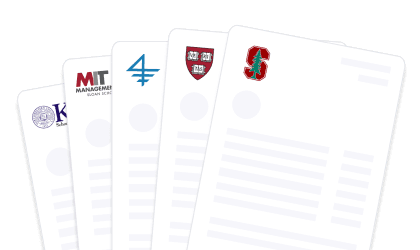
Join a free event
Learn from top coaches and industry experts in live, interactive sessions you can join for free.
Table of Contents
One-year MBA programs are gaining serious traction, and for good reason. In today's dynamic business environment, professionals are looking for faster, smarter ways to gain essential skills without stepping away from work for too long. A traditional two-year MBA still has its merits, but for many, a one-year MBA offers the right balance of efficiency, cost, and career advancement.
In this guide, we’ll break down everything you need to know about one-year MBA programs: who they’re for, what they cost, what the experience is really like, and how to get into a top program. We’ll also compare them to two-year programs, highlight the best schools, and share tips for making your application stand out.
Read: The Different Types of MBA Programs—and Which One is Right for You
What Is a One-Year MBA—and How Is It Different?
A one-year MBA is a full-time, accelerated MBA program that condenses core courses and elective courses into a 10–12 month timeline. Unlike two-year MBA programs, these options skip summer internships and assume that incoming MBA students already have foundational business knowledge or experience.
Key Differences Between One-Year and Two-Year MBA Programs
| Feature | One-Year MBA | Two-Year MBA |
|---|---|---|
| Duration | Typically 10–12 months. | Typically 20–24 months. |
| Internship Opportunities | Limited or not included due to the accelerated schedule. Some programs may offer short-term internships or project-based experiences during the academic year or winter break. | Summer internships are a core component, usually between the first and second years, providing practical experience and networking opportunities. |
| Cost | Total cost ranges from approximately $100,000 to $150,000, depending on the institution. For example, Columbia Business School's one-year MBA program costs around $127,058. | Total cost can exceed $200,000. For instance, Stanford Graduate School of Business estimates the total two-year cost at $250,854. |
| Ideal Candidates | Professionals with 5–7 years of experience seeking career acceleration or advancement within their current industry. | Individuals with 2–5 years of experience aiming to switch careers, industries, or functions, or those seeking a comprehensive business education. |
| Program Structure | Intensive and fast-paced, covering a significant portion of the curriculum in a condensed timeframe. Emphasizes core business fundamentals with limited electives. | Broader and exploratory, allowing for in-depth study, a wide range of electives, and opportunities for specialization. Includes summer internships and extracurricular activities. |
| Networking Opportunities | More limited due to the condensed schedule, students may have fewer opportunities to engage in clubs and extracurricular activities. | Extensive networking opportunities through internships, student organizations, and events over two years. |
| Return on Investment (ROI) | Higher short-term ROI due to lower opportunity cost and quicker return to the workforce. | Potentially higher long-term ROI, especially for those making significant career changes or entering high-paying industries. |
| Flexibility | Less flexible; the accelerated nature requires a clear focus and commitment. | More flexible; allows time for exploration, internships, and adjusting career goals. |
| Geographic Availability | More common in Europe and Asia; select U.S. institutions offer one-year programs. | Widely available across U.S. business schools. |
| Common Specializations | Often limited due to time constraints; may include general management or specific tracks like business analytics. | Wide range of specializations available, including finance, marketing, entrepreneurship, and more. |
If you already have a business background and focused career goals, a one-year MBA program can be a powerful way to build leadership skills, deepen business strategy knowledge, and move your career forward faster.
Who Should and Shouldn’t Pursue a One-Year MBA Program?
Not all professionals benefit equally from a one-year format. Understanding whether this path fits your experience and goals is key to getting the most value.
Ideal Candidates for One-Year MBA Programs
A one-year MBA compresses everything—core classes, electives, and career development—into 10-12 action-packed months. Because the pace leaves little room for exploration, it works best for candidates who already know where they’re headed and can hit the ground running on day one. Schools want applicants who have demonstrated focus, resilience, and leadership in fast-moving environments and who will translate classroom concepts into immediate results back at work.
Ideal fits for the accelerated track:
- 3–5 years of solid professional experience, with tangible progression
- Mid-career managers aiming to level up within the same industry rather than pivot
- Graduates who’ve already covered core business subjects in undergrad or professional certificates
- Entrepreneurs, consultants, and family-business leaders who need sharper tools, not a career reset
If your primary goal is to accelerate advancement in your current field while limiting time—and opportunity cost—away from the workforce, the one-year MBA gives you exactly the fast runway you need.
When to Consider a Two-Year MBA Instead
A traditional two-year MBA stretches learning and career exploration across four full semesters, giving students the extra runway to experiment, network, and reposition themselves before re-entering the job market. The extended timeline is tailor-made for professionals who need breathing room to test new paths, secure multiple internships, and absorb a wider range of electives before locking in their post-MBA plans.
When the extended format makes sense:
- You’re planning a significant career pivot and want ample time to rebrand
- Multiple internship cycles will help you confirm (or discard) new industry interests
- Deep relationship-building—classmates, faculty, recruiters—is a top priority
- You need a comprehensive refresher on core business disciplines before specializing
If your goal is a major industry switch, prolonged internship recruiting, or deep exploration of electives, a traditional two-year MBA usually offers a better runway.
What to Expect: Inside the One-Year MBA Experience
A one-year MBA is a fast-paced sprint, not a casual jog. You'll tackle intensive classes, collaborate on real-world projects, and build a strong network—all within a compressed timeline. The experience demands commitment but offers tremendous rewards for those ready to dive deep into an accelerated learning environment.
Most programs begin in the summer with foundational required courses that establish your business fundamentals. These typically include accounting, economics, operations, marketing, and business strategy: core subjects that provide the essential knowledge base for advanced business decision-making. After completing these prerequisites, you'll transition into elective courses during the fall and spring semesters. Many programs offer over 200 electives, creating opportunities for deep specialization in areas such as business analytics, finance, marketing, supply chain management, healthcare, international business, and project management. This flexible curriculum structure allows students to tailor their MBA experience to their career goals, even within the constraints of a tight schedule.
Learning Environment and Expectations
The learning environment is characterized by long days and an immersive, fast-paced schedule that keeps you constantly engaged. You'll participate extensively in group work and hands-on learning experiences, collaborating closely with MBA students from diverse professional and cultural backgrounds. The program maintains constant deadlines and places strong emphasis on real-world problem solving, preparing you for the dynamic challenges of modern business leadership. While one-year MBA programs offer fewer opportunities to pivot or change direction compared to traditional two-year programs, many students find the intensity both energizing and career-defining, creating a transformative experience that accelerates their professional development.
Key Benefits of the One-Year MBA Format
Accelerated Career Advancement: You'll return to the workforce quickly with enhanced skills and credentials, minimizing time away from earning potential while maximizing your professional growth trajectory.
Intensive Network Building: The compressed timeline creates stronger bonds with classmates and faculty, as you'll work closely together through challenging projects and tight deadlines.
Cost-Effective Investment: Lower tuition costs and reduced opportunity costs make the one-year format financially attractive compared to traditional two-year programs.
Focused Learning Experience: The streamlined curriculum eliminates redundancy and concentrates on essential business skills, ensuring every moment contributes to your professional development.
Immediate Application: The fast-paced nature means you'll apply new concepts and frameworks in real-time, reinforcing learning through practical implementation throughout the program.
What Does a One-Year MBA Program Cost?
The average one-year MBA cost in the U.S. is around $63,000, but top MBA programs charge more. Here's a breakdown:
| School | Program | Tuition (2024 est.) | Total Cost | Notes |
|---|---|---|---|---|
| Cornell Johnson | One-Year MBA | ~$123,000 | ~$160,000 | Requires an advanced degree or CPA |
| USC Marshall | IBEAR MBA | ~$134,000 | ~$165,000+ | Designed for mid-career professionals |
| Babson College | One-Year MBA | ~$89,550 | ~$115,000 | Entrepreneurship-focused |
| University of Pittsburgh (Katz) | Accelerated MBA | ~$52,700 (in-state) | ~$80,000+ | Affordable for PA residents |
| Pepperdine Graziadio | One-Year MBA | ~$83,180 | ~$110,000 | Strong in ethical leadership, smaller class sizes |
Full Cost Breakdown
- Tuition (70–80% of cost)
- Mandatory fees: $6,000–$8,000
- Living expenses: $25,000–$37,000
- Books and supplies: $900–$1,200Health insurance: ~$6,000
The opportunity cost is lower, too. A two-year MBA can cost you over $150,000 in lost wages. A one-year MBA program cuts that in half.
How to Pay for a One-Year MBA Program
Financing a one-year MBA requires strategic planning and a comprehensive understanding of your funding options. While these programs typically cost between $60,000 and $120,000, the compressed timeline means you'll face the full financial burden in a single academic year rather than spreading costs across two years. The good news is that multiple financing sources can be combined to make your MBA investment manageable, from merit-based scholarships and federal loans to employer sponsorship and innovative financing arrangements.
Scholarships and Financial Aid
Merit scholarships represent one of the most valuable funding sources, with many schools offering awards ranging from $10,000 to $40,000 or more based on your professional background, academic achievements, and GMAT or GRE scores. These scholarships are typically awarded automatically during the admissions process, making strong test scores and application materials crucial for maximizing your financial aid potential. Named fellowships provide another significant opportunity, with prestigious institutions like Emory offering substantial awards for standout applicants who demonstrate exceptional leadership potential and academic excellence.
Federal loan options form the backbone of MBA financing for most students. You can access unsubsidized federal loans up to $20,500 per year, which offer favorable interest rates and flexible repayment terms. For costs exceeding this limit, Graduate PLUS loans cover the remaining balance up to your school's total cost of attendance, though these carry higher interest rates and require a credit check. Veterans have access to additional resources through the Yellow Ribbon Program, which helps cover tuition costs for qualifying students and can significantly reduce out-of-pocket expenses when combined with other GI Bill benefits.
International students face unique financing challenges but have increasingly viable options available. No-cosigner loan providers like Prodigy Finance specialize in MBA financing for international students, evaluating applications based on future earning potential rather than current credit history or requiring a U.S.-based cosigner. These loans typically offer competitive rates and terms specifically designed for graduate business education.
Additional Financing Strategies
- Employer Sponsorship Programs - Many companies offer tuition reimbursement or educational assistance programs that can cover partial or full MBA costs, often in exchange for a commitment to return to the organization for a specified period after graduation.
- Graduate Assistantships and Work-Study Opportunities - Some programs offer teaching or research assistant positions that provide tuition remission plus a modest stipend, though these are less common in intensive one-year formats due to time constraints.
- Private Student Loans and Refinancing - Banks and private lenders offer education loans with varying terms and rates, and students can often refinance existing loans to secure better terms once enrolled in their MBA program.
- Personal Savings and Family Support - Many students combine savings from their pre-MBA career with family contributions to reduce their overall debt burden, making financial planning and early preparation essential components of the MBA journey.
- Income Share Agreements (ISAs) - Some schools and third-party providers offer ISAs where students pay a percentage of their post-graduation income for a set period instead of traditional loans, aligning repayment with career outcomes.
Read: MBA Financial Aid: How to Pay for Business School
Top One-Year MBA Programs in the U.S.
These are the best one-year MBA programs to consider:
| School & Program | Location | Tuition | Ideal For | Key Features | Unique Strengths |
|---|---|---|---|---|---|
| Kellogg School of Management (Northwestern) | Evanston, IL | $140,366 | Professionals with an undergrad business background; 5–7 years of experience | - 10–12 months (June–June) - 200+ elective courses - STEM-designated track | - Skip core courses - Top-ranked faculty - Strong in marketing, leadership, and business analytics |
| Cornell Johnson One-Year MBA | Ithaca, NY | $123,000 | Applicants with advanced degrees or certifications (e.g., CPA, CFA, engineers) | - 12-month format - Core courses in summer, electives with 2nd years - Consulting and tech focus | - Small cohort size |
| Duke Fuqua Accelerated Daytime MBA | Durham, NC | $138,421 | Students with prior Master’s (e.g., MiM) or extensive core business coursework | - 10-month format - Join 2nd years for electives - International immersion | - Global business exposure - Highly collaborative cohort - Focus on inclusive leadership |
| USC Marshall IBEAR MBA | Los Angeles, CA | $134,000 | Mid-career professionals (avg. 11–12 years’ experience) | - 12-month executive MBA - Emphasizes global city economies - Strong peer consulting | - International project residencies - Network of senior professionals - Heavy focus on international business |
| Emory Goizueta One-Year MBA | Atlanta, GA | $122,479 | Career accelerators with clear post-MBA goals; ~5 years of experience | - STEM-designated - Summer core, fall/spring electives - 20+ student clubs | - Tight-knit class size - Strong access to healthcare, finance, and consulting markets |
| Babson College One-Year MBA | Wellesley, MA | $89,550 | Aspiring entrepreneurs and innovators | - 12 months - Startup incubators and venture labs - Leadership labs | - Ranked #1 in entrepreneurship (U.S. News) - Strong hands-on learning - Integrated project management and business strategy |
| University of Pittsburgh (Katz) Accelerated MBA | Pittsburgh, PA | $52,700 (in-state) | Budget-conscious professionals or PA residents | - 11 months - Leadership and team | - Competitive ROI - Focus on professional development and essential skills |
How to Get Into a One-Year MBA Program
Admission to a one-year MBA program is highly competitive, with schools seeking candidates who can thrive in an accelerated academic environment while contributing meaningfully to classroom discussions and group projects. The application process requires careful preparation and strategic positioning to demonstrate both your readiness for intensive graduate study and your potential for significant career advancement.
General Admission Requirements
Most one-year MBA programs expect candidates to have between two and five years of professional work experience, providing the practical foundation necessary to engage with advanced business concepts and case studies. Generally speaking, you'll need a bachelor's degree with strong academic performance, typically demonstrated through your undergraduate GPA and coursework rigor. Standardized test scores from the GMAT or GRE are generally required, though an increasing number of schools offer waivers for candidates with strong professional backgrounds or advanced degrees. International applicants must demonstrate English proficiency through TOEFL or IELTS scores, and all candidates need to secure letters of recommendation from supervisors or colleagues who can speak to their professional capabilities and potential.
Your application package must include a compelling resume that highlights career progression and achievements, along with well-crafted essays that articulate your goals and motivations. These written components serve as your opportunity to differentiate yourself from other qualified candidates and demonstrate the unique perspective you'll bring to the program.
Strategic Application Tips
- Apply in the First Round - Early applicants not only demonstrate serious commitment to the program but also have the best opportunity to secure merit-based scholarships, as schools typically allocate the majority of their financial aid during the initial application cycle.
- Select Recommenders Strategically - Choose individuals who have worked closely with you and can provide specific examples of your performance, leadership abilities, and potential for growth, rather than simply selecting someone with an impressive title who knows you only superficially.
- Develop a Coherent Career Narrative - Create a clear storyline that connects your past experiences to your future professional goals, explicitly explaining how the MBA program serves as the essential bridge between where you've been and where you want to go.
- Emphasize Leadership and Impact - Highlight concrete examples of projects you've led, promotions you've earned, and skills you've developed over time, demonstrating your ability to take initiative and drive results in professional settings.
- Research Program Fit - Tailor your application materials to each specific program, showing how their curriculum, culture, and opportunities align with your career objectives and learning style.
Expert tip: For personalized guidance through the MBA admissions process tailored to your goals and background, work closely with a top MBA coach.
Read: MBA Requirements: What You Need to Apply (and What Top Programs Really Look For)
Is a One-Year MBA Worth It?
| Advantages | Drawbacks |
|---|---|
| Lower Tuition & Opportunity Cost - Total cost is ~$50K–$100K lower than most two-year MBAs. You also return to work a year earlier, saving ~$100K+ in potential lost salary. | Fewer Internship Opportunities - No summer internship makes it harder to pivot industries or roles. This is a challenge for career changers. |
| Faster Return to the Job Market - Programs last just 10–12 months, allowing quicker re-entry and faster ROI. | Compressed Curriculum - The pace is intense and leaves less room for academic exploration, electives, or non-core topics. |
| High ROI for Career Accelerators - Graduates from top one-year MBAs (e.g. Kellogg, MIT Sloan Fellows) report salaries of $165K–$175K within months of graduation. | Limited Time for Networking - With less time on campus, it’s harder to build deep connections or join multiple student organizations. |
| Ideal for Focused Professionals - Perfect for those with clear goals and strong experience (5+ years), especially if staying in the same industry. | Not Ideal for Explorers - If you’re still figuring out your path or want broad exposure, a two-year MBA offers more flexibility. |
| Streamlined Application Process - Fewer total essays and often shorter programs to prep for, ideal for time-strapped professionals. | Limited Availability - Only a handful of top U.S. business schools offer one-year MBAs compared to two-year options. |
Is a One-Year MBA Right For You?
A one-year MBA program offers a unique opportunity to gain valuable business knowledge, expand your network, and accelerate your career, without pressing pause for two full years. For ambitious professionals with meaningful work experience and focused career goals, it’s a smart, strategic choice.
Just be sure you’re ready for the rigor. These programs move fast, demand clarity, and expect you to hit the ground running. If you're serious about making the most of your time and investment, the right preparation makes all the difference.
Want to boost your chances at a top one-year MBA? Work with a top MBA coach to build a personalized application strategy, refine your essays, and prepare for interviews with expert feedback—so you can apply with clarity and confidence.
See: The 10 Best MBA Admissions Consultants
Read these next:
- Full-Time MBA Program: Advantages & Disadvantages
- 15+ Affordable Online MBA Programs
- MBA Application Timeline: What to Do and When to Apply (Month-by-Month Guide)
- The 25 Best Part-Time MBA Programs
- Average GMAT Score by School: Business Schools Ranking
FAQs
Can I work while enrolled in a one-year MBA program?
- While some programs allow part-time work, the intensive nature of one-year MBAs often makes it challenging. For instance, Emory's Goizueta Business School advises students not to make travel or employment plans during the initial semesters due to the program's rigor.
Is a one-year MBA program accredited?
- Yes, most reputable one-year MBA programs are accredited by recognized bodies. For example, the University of Colorado Denver's One-Year MBA is fully accredited by the Association to Advance Collegiate Schools of Business International (AACSB).
Do one-year MBA programs offer specializations or concentrations?
- While the compressed timeline may limit extensive specialization, many programs offer elective courses in areas like finance, marketing, or business analytics. However, formal specializations might not be available in all one-year MBA programs.
Are there dual-degree options with one-year MBA programs?
- Some institutions offer pathways to pursue additional degrees alongside or after completing a one-year MBA. For instance, after finishing the One-Year MBA at CU Denver, students have the option to apply for an MS degree from the same business school, potentially requiring fewer credit hours.
When do one-year MBA programs typically start?
- Start dates can vary by institution. For example, Emory's Goizueta Business School's One-Year MBA program begins in early May, while their Two-Year MBA starts in late July.
Browse hundreds of expert coaches
Leland coaches have helped thousands of people achieve their goals. A dedicated mentor can make all the difference.

























